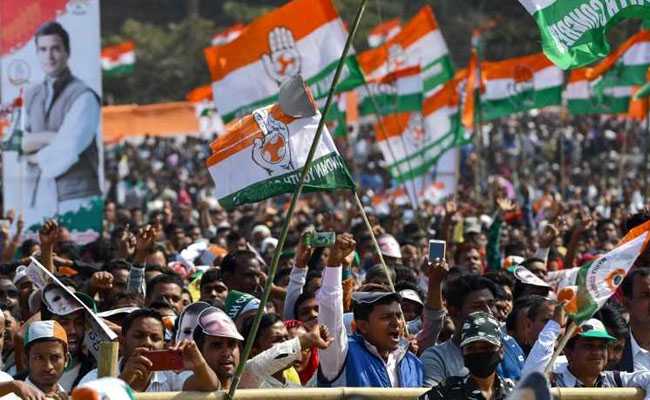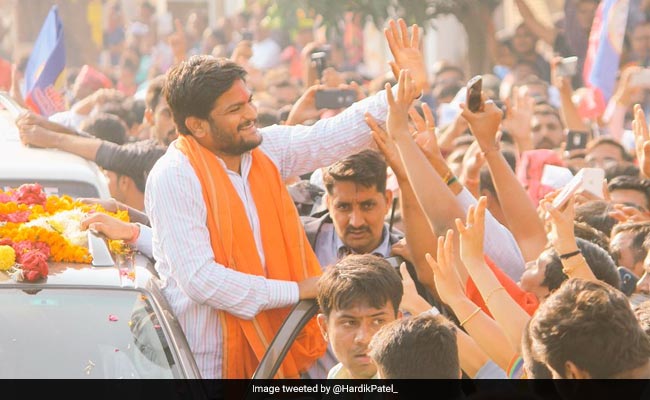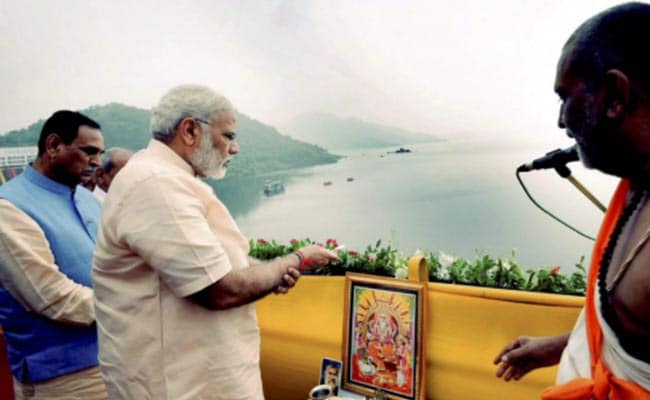
In the town of Surendranagar, the gateway to the region of Saurashtra in his home state of Gujarat, Prime Minister Narendra Modi's audience earlier this week was not made up entirely of farmers, but it was to them that he reached out repeatedly with this message: I got you.
"All farmers will be able to access Rs 6,000 annually," he announced, upgrading the PM-Kisan scheme which makes a direct payment to those whose farms are upto two hectares in size. Mr Modi's offer to extend the yearly handout to all farmers, not just those with small landholdings, was accompanied by a promise of an old-age pension program.
On the outskirts of Surendranagar, Suresh Makwana grows cumin on his eight acres of land. "Last year, Gujarat had its worst monsoon since 1901. Surendranagar district was declared scarcity-hit (officialese for a drought). My crop was ruined, but still the insurance company dismissed my claim of Rs 30,000," he lamented.

Farmers are furious with escalating debt and falling crop prices
Since the beginning of this year, nearly 15 lakh farmers across arid Saurashtra and north Gujarat have been holding regular protests to call attention to their insurance claims being either rejected or ignored, making it one of the biggest issues in this rural heartland, which holds seven of Gujarat's 26 Lok Sabha seats; all of them vote on Tuesday.
"The Congress will victimize Gujarat if it is voted to power at the Centre," Mr Modi claimed in his address in Surendranagar. "How different will it be from what the BJP is doing to us right now?" challenged Mr Makwana, 60, who in 2014 voted for Mr Modi when the then Gujarat chief minister won the country's top job with a record mandate.

In 2017, the Congress won 30 of the 54 seats in Saurashtra
Mr Modi draped the assembly election in Gujarat in 2017 with similar allegations against the Congress but the party, which was last in power in the state over two decades ago ago, made big gains. In Saurashtra, it won 30 of 54 seats, more than doubling its tally.
In the state election in 2017, the BJP won 85 percent of the urban seats but 37 percent of rural seats. "It was a reflection of farmer anger with the state government, which has only grown in the last year," claims Soma Patel, the Congress candidate from Surendranagar.

Congress' Soma Patel (extreme right) says rural distress is the only election issue in Saurashtra
Dr Mahendra Munjpara, the BJP contender, however, claims that the party's 2017 limp in Saurashtra was a hard-luck story attributable to Hardik Patel, then just 20 years old, who led the youth of his powerful and prosperous caste, the Patels or Patidars, in rebellion against the BJP, their traditional political choice. They wanted affirmative action policies to apply to them because Mr Modi's industrialization of Gujarat had excluded them from progress, Hardik Patel said.
The swift embrace of his message was "a misadventure" by Patel youth, claims Dr Munjpara. "The issue of reservation had become very emotive and Hardik Patel was able to mobilise young Patels across sub-castes against the BJP. But after the PM passed a bill giving 10% quota in government jobs and education to the economically weaker sections across castes, it was end-game for the agitation. The Patels are back with us", the doctor claims.
The Patels form 14 percent of Gujarat and are the largest community in Saurashtra followed by Other Backward Castes.

Hardik Patel admits reservation is no longer an election issue; lack of jobs is
Hardik Patel, now 25, who joined the Congress last month and is campaigning in Saurashtra, including Surendranagar, where he was slapped by a man yesterday at an election meeting who blamed him for the Patidar agitation, agrees that reservation is no longer the raging issue. "But even back then, it was linked to lack of jobs. That problem has not gone away, it has become acute and is continuing to agitate young Patidars, especially those who come from farming families and see no future in the land," he told NDTV.
The BJP, in an attempt to placate the community and reclaim Saurashtra, hosted a Patidar Global Business Summit last year, where Chief Minister Vijay Rupani assured jobs to 10 lakh Patidar youth by 2026. In March this year, the PM performed the ground-breaking ceremonies of two separate temples being built by the Lehuva patels and Kadva patels - the two prominent Patel sub-castes.

The CWC (Congress Working Committee) met in Gujarat for the first time after 58 years
But just in case, the BJP has simultaneously begun attempts to gain the Other Backward Caste vote which has traditionally gone with the Congress. The party has engineered the defections of five opposition lawmakers, four of them OBCs, from Saurashtra. "We are in politics to win, and if this is the easiest way to tap into a critical voter base, then we have to go for it," a BJP leader from Amreli district in Saurashtra told NDTV.
The crossovers included Kuvarji Bavaliya who was made a minister in the state government hours after changing sides. Mr Bavaliya was recently caught on camera telling a group of women who complained about shortage of drinking water in their village near Rajkot, 100 kms from Surendranagar, that they were paying the price for not voting for him in large enough numbers.

PM Modi blames the Congress for delaying the Narmada project and the water crisis
It is the insensitivity of the government - perceived or real, depending on who you talk to - towards farmers that is in heavy rotation as a complaint in this part of Gujarat. In 2014, Mr Modi, who won a spectacular mandate, promised to double farmers' income. Three years into his term as PM, a report of the union agricultural ministry said that nearly 43 percent of the 40 lakh agricultural households in Gujarat were in debt.
"Only 30% of farmers in the Surendranagar district have received a pay out from the insurance companies who are making massive profits on the premium," alleges JK Patel, president of the Bhartiya Kisan Sangh which is openly backing the farmers' agitation. The union is affiliated to the Rashtriya Swayamsewak Sangh or RSS, which is the ideological parent of the BJP and whose cadre are indispensable in the party's election efforts.

JK Patel, president of the RSS-backed Bhartiya Kisan Sangh, claims the insurance companies are fleecing the farmers
Across the country, farmers are furious with escalating debt and falling crop prices. In Saurashtra, the drought has brought another inimical contender: insurance firms that want to have nothing to do with them.
The insurance effort launched in 2016 to protect small farmers from weather calamities, the Pradhan Mantri Fasal Bima Yojana, is designed to reduce risks to farmers while making it cheap for them to get cover. They pay 2% of the premium, the rest is shared between the centre and the state. But it is insurance firms in Gujarat that, from all accounts, have hit pay dirt. In 2017-18, a premium of nearly 7,000 crores was paid to them; settled claims amounted to about 2,300 crores, the state legislature was told.
This is part of Saurashtra's new vexation as it decides who to choose on Tuesday, torn between its long-standing loyalty to the BJP and its recent shift to the Congress.
Track Latest News Live on NDTV.com and get news updates from India and around the world

